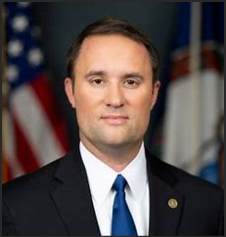
by James A. Bacon
The battle for control of higher-ed institutions in Virginia is boiling over into the state legislature. Senator Scott Surovell, D-Mount Vernon, has submitted a bill, SB 506, that would allow Virginia’s public universities to hire their own legal counsel in place of lawyers answering to the Attorney General.
The bill would give governing boards of every institution authority over the hiring of “outside legal counsel, the oversight and management of any legal counsel, and the appointment of a general counsel to serve as the chief legal officer of the institution.”

Public universities are classified as state agencies. Like other state agencies, their legal interests are represented by counsel that reports to the Office of Attorney General.
The underlying political conflict is who controls Virginia’s colleges and universities. The issue surfaced last year when former Bowdoin University President Clayton Rose addressed the University of Virginia’s Board of Visitors and suggested that board members owe their primary loyalty to the institution, not their personal agendas. He received pushback from two board members appointed by Governor Glenn Youngkin who argued that the duty of board members is to represent the interests of the Commonwealth of Virginia, not the institution itself.
Youngkin asked Attorney General Jason Miyares to address the question. Miyares issued a finding that, indeed, the primary duty of board members is to the Commonwealth. This led to allegations that the finding could pave the way for Youngkin to get rid of board members he doesn’t like.
“This effort to define the boards as having to be ‘loyal to the commonwealth’ is all about trying to position the way that the governor’s authority is structured,” said Claire Guthrie Gastañaga, a UVA law school grad, chief deputy attorney general, and former president of the Virginia chapter of the ACLU. “This is for getting rid of people.”
There is zero evidence to support Gastañaga’s charge. Youngkin has not tried to evict any board member at the University of Virginia or, to my knowledge, at any other institution. Rather, he has waited for board positions to expire before putting his own selections into place. Meanwhile, adopting a non-confrontational approach, he has chosen to advance his top goals of protecting free speech and promoting viewpoint diversity by enlisting the cooperation of university presidents and administrators. At a higher-ed summit late last year, presidents were asked to prepare their own institution-specific plans for putting the principles into action.
In truth, the bill will have little impact on the Governor’s authority. But it will directly impact the Attorney General’s authority. In early 2022, Miyares ousted UVA’s chief counsel Timothy Heaphy, who had been appointed at the urging of President Jim Ryan, over disagreements the AG’s office had with unspecified legal decisions. Miyares was, of course, accused of playing politics, although his accusers never articulated a credible theory of what political motive he might have had. To replace Heaphy, he appointed Cliff Iler, largely on the basis of his knowledge of healthcare law relevant to UVA’s health system. Iler, who is moderately conservative in his personal politics, has proven to be technocratic in his approach to the office.
The ulterior motive behind the legislation, I would suggest, is to help university presidents gain control over the offices of legal counsel as UVA and other institutions grapple with the implications of the U.S. Supreme Court ruling over the role of race in admissions. Before the ruling, UVA and other public universities unabashedly gave preferential treatment to so-called “marginalized” groups — Hispanics and Blacks specifically — in undergraduate admissions, graduate school recruitment, and the hiring and promotion of faculty members. Now they must craft mechanisms to achieve the same goals without running afoul of the ruling. Legal counsels can either help them or thwart them in this effort. At present, every legal counsel reports to Miyares, a Republican who opposes racial preferences.
The stakes will be higher come July 1, 2024, when Youngkin makes his next round of Board of Visitors appointments. At long last, his appointees will constitute a majority of every board and have the latitude to compel left-leaning presidents to modify policies on racial preferences and Diversity, Equity & Inclusion. University counsels could be pivotal players in clashes to come.
How SB 506 would work out in practice is not clear, though. The bill would confer the hiring authority upon the “governing board” of each institution. Boards, not university presidents, would call the shots on whom to hire. Would Youngkin appointees, who will dominate boards as of July 1, agree to replace Miyares-appointed university counsels with outside counsel? That’s an open question. If board members are passive and compliant, as is typically the case, university presidents might well get their way and hire whom they want.
According to the Times-Dispatch, Surovell said he was responding to board members who called him to express confusion. “(They) need to be able to hire counsel that will give them straight legal advice that’s not affected by political considerations.”
Are we to believe that firing university counsel for providing “political” advice is not itself being “political”? Are we to believe that the bill is not designed to allow universities to hire private counsel that will tell the presidents what they want to hear? Let’s just be honest, everyone is maneuvering for political advantage.
And that includes Surovell, a University of Virginia law school grad, Democrat, and savvy politician who worked his way up to the position of Senate Majority Leader. His daughter Eva was the editor of The Cavalier Daily and a lead author of attacks on Bert Ellis. Smearing the Youngkin nominee as a racist and homophobe largely on the basis of her articles, Democrats came within a hair’s width of blocking his appointment to the UVA Board. Surovell is highly attuned to the internal politics of UVA, and it’s not a stretch to suggest that he wrote SB 506 with UVA very much in mind.
Full disclosure: Bert Ellis was president of The Jefferson Council before resigning to serve on the UVA Board of Visitors.
James A. Bacon is executive director of the Jefferson Council. This column is published with permission from The Jefferson Council blog.

Leave a Reply
You must be logged in to post a comment.